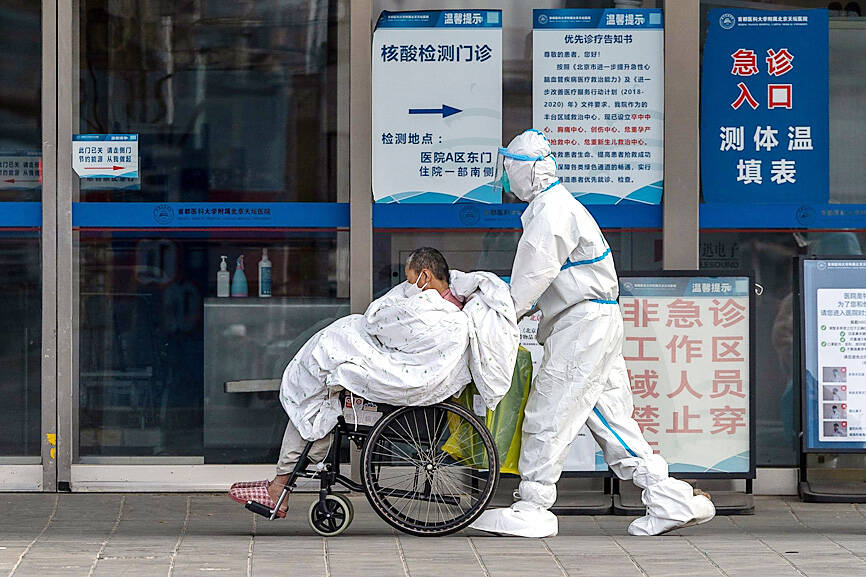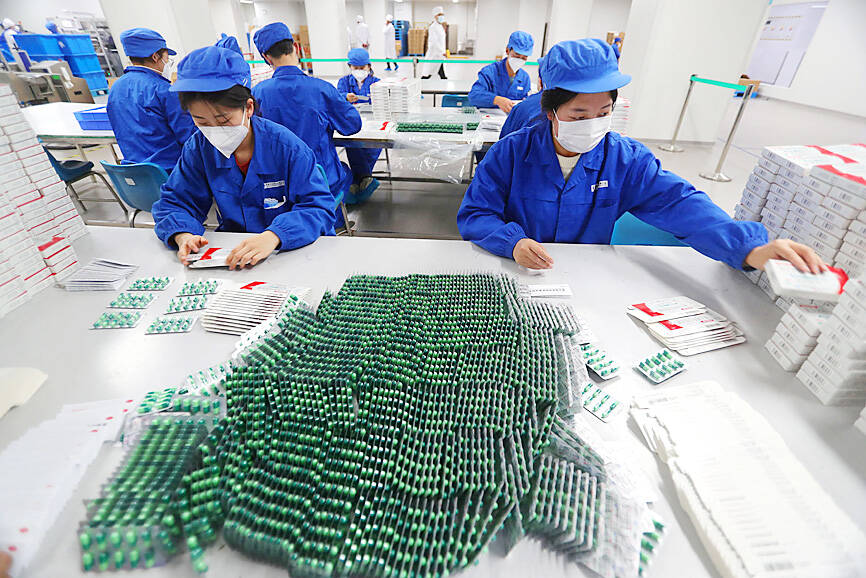China’s COVID-19 cases have become “impossible” to track, the country’s top health body said yesterday, with officials warning that cases are rising rapidly in Beijing after the Chinese government abruptly abandoned its “zero COVID-19” policy.
Beijing’s move to scrap mass testing and quarantines after nearly three years of attempting to stamp out the virus has led to a drop in officially reported infections, which last month hit an all-time high.
However, those numbers no longer reflect reality because testing is no longer required for much of the country, the Chinese National Health Commission said in a statement.

Photo: Bloomberg
“Many asymptomatic people are no longer participating in nucleic acid testing, so it is impossible to accurately grasp the actual number of asymptomatic infected people,” the commission said.
The statement came after Chinese Vice Premier Sun Chunlan (孫春蘭) said new infections in the capital were “rapidly growing.”
Chinese leaders are determined to press ahead even though the country is facing a surge in cases that experts fear it is ill-equipped to manage. Millions of vulnerable older people are still not fully vaccinated against COVID-19, and underfunded hospitals lack the resources to deal with an influx of infected patients.

Photo: REUTERS
Authorities said they would begin allowing vulnerable people, including those aged 60 or older, to receive a second COVID-19 vaccine booster six months after their first.
A line of about 50 people stretched out the door of a fever clinic in Beijing yesterday, with multiple residents saying they were infected with COVID-19.
“Basically, if we are lining up here, we are all infected. We would not come here if we weren’t,” one person waiting in line said. “I’m here with a senior member of my family, he’s had a fever for nearly 10 days in a row now, so we are coming to do a checkup on him.”
Restaurants, shops and parks are allowed to reopen, but residents are not finding the path to living with the virus straightforward.
Many symptomatic cases have opted to self-medicate at home, while others are staying in to protect themselves from getting infected.
Businesses are also struggling as COVID-19 rips through the population and hits their staffing. As a result, the capital’s streets are largely empty.
“Basically I follow the requirements of the Beijing government, that the elderly should stay home and go out as little as possible,” said one resident in his 80s who declined to give his name.
He said he was not too worried because he thought that the Omicron variant of SARS-CoV-2 was mild, but added that “there shouldn’t be complete relaxation and freedom.”
“If we are dead, how can we be free, right?” he said.
People have complained of sold-out cold medicines and long lines at pharmacies, while Baidu Inc (百度) said that Internet searches for fever-reducing ibuprofen had risen 430 percent over the past week.
Soaring demand for at-home COVID-19 tests and medications has created a black market with astronomical prices, while buyers resort to sourcing the goods from “dealers” whose contacts are being passed around WeChat groups.
Authorities are cracking down, with market regulators hitting one business in Beijing with a 300,000 yuan (US$43,166) fine for selling overpriced test kits, the Beijing News reported on Tuesday.
In a sea change for a country where COVID-19 infection was once taboo and recovered patients faced discrimination, people are now taking to social media to show off their test results and give detailed descriptions of their experiences while infected.
A Beijing resident in his 50s said: “I think everyone has got used to it. They have moved on... I don’t think people are that fragile.”

CALL FOR SUPPORT: President William Lai called on lawmakers across party lines to ensure the livelihood of Taiwanese and that national security is protected President William Lai (賴清德) yesterday called for bipartisan support for Taiwan’s investment in self-defense capabilities at the christening and launch of two coast guard vessels at CSBC Corp, Taiwan’s (台灣國際造船) shipyard in Kaohsiung. The Taipei (台北) is the fourth and final ship of the Chiayi-class offshore patrol vessels, and the Siraya (西拉雅) is the Coast Guard Administration’s (CGA) first-ever ocean patrol vessel, the government said. The Taipei is the fourth and final ship of the Chiayi-class offshore patrol vessels with a displacement of about 4,000 tonnes, Lai said. This ship class was ordered as a result of former president Tsai Ing-wen’s (蔡英文) 2018

‘SECRETS’: While saying China would not attack during his presidency, Donald Trump declined to say how Washington would respond if Beijing were to take military action US President Donald Trump said that China would not take military action against Taiwan while he is president, as the Chinese leaders “know the consequences.” Trump made the statement during an interview on CBS’ 60 Minutes program that aired on Sunday, a few days after his meeting with Chinese President Xi Jinping (習近平) in South Korea. “He [Xi] has openly said, and his people have openly said at meetings, ‘we would never do anything while President Trump is president,’ because they know the consequences,” Trump said in the interview. However, he repeatedly declined to say exactly how Washington would respond in

WARFARE: All sectors of society should recognize, unite, and collectively resist and condemn Beijing’s cross-border suppression, MAC Minister Chiu Chui-cheng said The number of Taiwanese detained because of legal affairs by Chinese authorities has tripled this year, as Beijing intensified its intimidation and division of Taiwanese by combining lawfare and cognitive warfare, the Mainland Affairs Council (MAC) said yesterday. MAC Minister Chiu Chui-cheng (邱垂正) made the statement in response to questions by Democratic Progressive Party (DPP) Legislator Puma Shen (沈柏洋) about the government’s response to counter Chinese public opinion warfare, lawfare and psychological warfare. Shen said he is also being investigated by China for promoting “Taiwanese independence.” He was referring to a report published on Tuesday last week by China’s state-run Xinhua news agency,

‘NOT SUBORDINATE’: Only Taiwanese can decide the nation’s future, and people preserving their democratic way of life is not a provocation, President William Lai said Taiwan does not want China’s “one country, two systems,” and must uphold its freedom and democracy as well as resolve to defend itself, President William Lai (賴清德) said yesterday, rejecting Beijing’s latest bid to bring the country under Chinese control. The president made the remarks while attending a commissioning ceremony for Taiwan’s first battalion of M1A2T Abrams tanks in Hsinchu County’s Hukou Township (湖口). The tanks are made by General Dynamics, a major US defense contractor. China this week said it “absolutely will not” rule out using force over Taiwan, striking a much tougher tone than a series of articles in state media